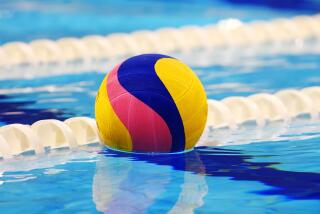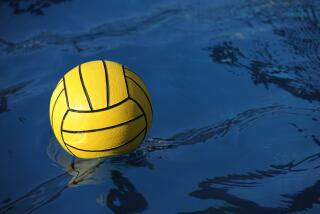They’re Left-Handed Complements : Lefties Playing a Big Role in Water Polo Tournament
- Share via
SAN DIEGO — In a world where right means correct and right-handers have the last consumer word, left-handers are making themselves heard.
The positive attributes of the left-handed are noted on shirts, bumper stickers and other novelty items. Speciality shops cater to left-handers.
And at the U.S. Senior Men’s National Water Polo Championship at UC San Diego’s Canyon View Pool, lefties also are making some noise.
Of the 103 players participating on eight teams Saturday, only 13 are left-handed. But after four games, which whittled the field in the round-robin tournament to four for today’s finals, four of the top six scorers were left-handed.
“Each good team has at least one,” said Dante Dettamanti, assistant national and Stanford team coach. Stanford, with two lefties--1988 Olympian Craig Klass and ambidextrous Eric Blum--advanced to today’s championship rounds with a 9-7 victory over Newport B and a 7-5 upset of previously undefeated and top-seeded Newport A.
“You like to have them on your team,” Dettamanti said. “It’s an advantage. They throw the defenders off.”
What they were throwing on this day were goals.
“It’s a significant advantage,” said Harvard Academy Coach Richard Corso, who with four lefties has an unusually high number on his team.
“They balance the front-court offense and the power play. They’re important in picks and screens, anywhere.”
The surviving lefties going into today’s final competition are those of Malibu (4-0), Geoff Clark and goalie Craig Wilson; Stanford (3-1), Klass and Blum, and Beach (3-1), Nick Baba and James Makshanoff. Newport A (3-1) has none.
The absence of a left-hander on Newport A--packed with nine national team members and three former Olympians--dispels any notion that being left-handed alone is enough.
“They have to be good,” Dettamanti said. “If you have to choose between a weak left-handed player and a strong right-handed player, then you always go with the strong right-hander.”
Malibu’s Clark, the leading scorer on Australia’s 1988 Olympic team, is the second-leading scorer (14 goals in four games) in this tournament. Malibu advanced to the final four with an 8-5 victory over Harvard Academy and a 11-9 victory over Golden Bear.
“Everyone knows all the best players in the world are left-handed,” said Clark with a smile. “Everyone’s expecting you to shoot from the other side. You’re just not used to it.”
Even the left-handed players don’t like playing against other lefties.
“I myself don’t like (guarding a left-hander),” said Clark, a sophomore at Pepperdine. “Everything’s harder against them. The timing’s different, the angles are different.”
Said Bruin Polo’s Alexis Rousseau, who scored 12 goals here: “Even me, I’m not used to them. Sometimes it’s surprising to be playing against them and have to stop and think, ‘oh, they’re left-handed.’ ”
According to coaches and players, lefties are most effective on offense in a six-on-five situation, when a penalty has left the defense short a player.
“When you’re a man up, that’s when you use him the most, because of positioning,” Dettamanti said. “You pass along the outside, always moving the goalie and the defense around. Left-handers can catch and shoot the ball immediately.”
Said Corso: “Right-handers have to stop and shoot across their bodies. Lefties don’t.”
And Clark has discovered that being left-handed has helped open the door to athletics.
“I’ve had a lot of break since I was young because I was left-handed,” he said. “It’s given me a lot of opportunities. Sportsmen aren’t exactly encouraged to change (hands).”
Besides, left-handers can add character to a team.
“Left-handers are a little unorthodox, a little off, anyway,” Dettamanti said. “In swimming, the breast-strokers are a little off. Left-handers are the same way.”
More to Read
Go beyond the scoreboard
Get the latest on L.A.'s teams in the daily Sports Report newsletter.
You may occasionally receive promotional content from the Los Angeles Times.






